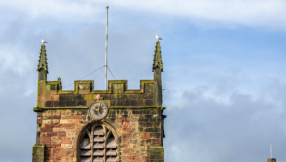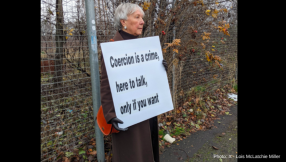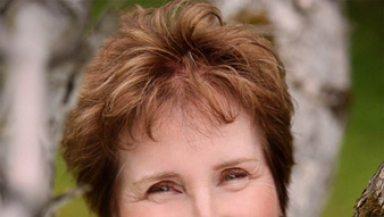
Francine Rivers has written over 20 bestselling Christian-themed novels (winning numerous awards), and regular readers eagerly anticipate each new publication. Her latest, 'Bridge to Haven', certainly will not disappoint.
Based in 1950s Hollywood, it is the story of Abra and her journey to find true love and acceptance. Abandoned at birth and never truly finding her place in her home town of Haven, the naïve young woman is vulnerable to the charms of the fast-talking rich boy who lures her away to Hollywood.
Once there, Abra soon learns what is expected of a girl with ambitions of fame. The price she pays is huge, but Abra has burned every bridge to get exactly what she thought she wanted and feels trapped as a consequence. If she were honest with herself she'd realise all she wants is a way back home (read our full review here).
I had the great opportunity of being able to ask Francine about the inspiration behind her new novel – and what she hopes her readers will glean from it.
CM: You have written about such varied subjects – a retelling of Hosea; the persecution of Christians in Roman gladiator times; the tradition of the sin-eater in 1850s Appalachia. Each one of them is written so expertly it seems that you must have immersed yourself in the subject. How do you go about researching each new topic?
FR: Almost every story begins with a question or issue with which I'm struggling, and each story seems to dictate the time in which it needs to be told. For example, when I was struggling with the question of how to share my faith with unsaved family and friends who didn't want to hear anything about Jesus, I thought of the early martyrs who died in Roman arenas. The result was 'A Voice in the Wind'.
'The Scarlet Thread' came from a study of sovereignty and a cross-country trip several friends and I took, following the Oregon Trail. Local museums showed story after story of people setting off to find a better life. Hardship and tragedy followed them across the prairie – along with the question: who is in control of our lives?
What is the difference between guilt and conviction was a question that fit the Appalachian highlands custom of sin eating, a practice brought over in the early days from Scotland and Wales. The result was 'The Last Sin Eater'. And 'The Shofar Blew' came out of questions on how to build a church in modern times amidst massive building projects that often destroy congregations.
In each case, once the time and place are set, it's a matter of immersing myself in the time period, finding good books, finding pictures, making binders with dividers between subject matter – what people wore, what their homes and daily lives were like, the political atmosphere, music, customs, etc. I even listen to music that fits the time period while I'm working. The writing process is a quest for answers and a journey with characters that become real people to me. Writing a story is my way of worshipping and praising the Lord.
CM Did you already know a lot about Hollywood in the 50s or were you researching from scratch for this book?
FR: I compiled binders full of information about the forties and fifties, World War II, the Korean War, medics serving in Korea, Hollywood studios and stars, along with Scripture that always speaks to the mind and heart of any human being. The Bible is like God's blueprint for mankind, how and why man was built, what happened when sin entered into our lives, and the cure.
Since I don't have a mind that retains information, I kept the binders and my Bible close at hand for constant reference. I am fortunate enough to have an exacting, knowledgeable editor (Kathy Olson) who makes sure the time lines and accompanying information are correct down to the smallest detail of which song might have been playing on the radio. And since I am very aware of my limitations and imperfections, I applaud and embrace her efforts.
CM: It was interesting to watch Abra being transformed into Lena Scott by her pushy agent. Were there particular messages you wanted to put across about identity and outward appearance?
FR: Abra felt she had no real identity. She believed she was a cast-off, abandoned by a mother who must not have loved or wanted her and then picked up by someone who gave her away when times got tough. Abra wanted to be someone others would love, respect and notice, and Hollywood with all the trappings promises fame.
She became the woman Franklin Moss dreamed, and lost all sense of herself in the process. We are all composites. We are who we think we are, what other people think of us, who we want to be and variations of all that. Only God knows who He made us to be. When we surrender to Him, He begins the transformation, and we begin to see our being in a new light. We were made out of His love and for a unique purpose. We are fully ourselves and fulfilled when we are in His will.
We all see stories of Hollywood starlets crashing and burning, their names splashed across the magazine covers in the front racks of every grocery store. At what cost fame? Who do they long to be? What painful experiences make them anaesthetise themselves through drugs and multiple relationships?
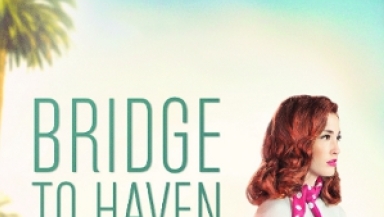
We live in a world that judges by outward appearances. We too often focus on sin. God sees the heart. He sees the longing of the soul. He holds the answers to all the questions we ask. As Christians, we should see beyond the physical and the headlines, too. We can pray for the lost. We can speak and write truth. We can love like Jesus.
CM: This story was a remaking of the Prodigal Son, but I also read you took Ezekiel 16 as your inspiration. Your books usually have a strong theme of redemption running in them so why did you go to those stories in particular this time?
FR: So many of the stories in the Bible are about prodigals. The Ezekiel allegory about God finding an abandoned baby along the roadside and rearing her to be his bride touched me as deeply as the Hosea story on which I based my novel, 'Redeeming Love'.
The world passes by "the least of these", but God lifts them, loves them and gives each a choice. We are born with a sin nature and give ourselves over to sin as we walk this earth, until such time when we become aware of God and our desperate need and longing for Him.
As the saying goes, we look for love in all the wrong places. When we seek Him, He is found. We find He's been there all the time, waiting for us to open our eyes and hearts. Abra went looking for love when she already had it. Pastor Zeke, Joshua, the Matthews, Mitzi always loved her. She just didn't have the eyes of faith to see.
CM: There are many links that can be made with bridges in this story – with people and places and, of course, ultimately Jesus. What do you hope people glean from your use of this metaphor?
FR: Hopefully, readers will understand Jesus is waiting. He is the bridge. He has provided the way through His death for our sins and His resurrection to cross over the chasm that has separated us from God. All we have to do is step out in faith to receive the indwelling of the Holy Spirit to be reunited with the One who created us and has always loved us and always will. We need not fear anything. All we have to do is accept the gift of salvation, trust in Jesus and we can be home.
CM: Abra has to make her own journey, through much pain and heartache, back over the bridge to Haven, her home. What is the significance of this framework of 'going home' – both physically and spiritually?
FR: One of the issues much on my mind over the past months is human trafficking, specifically the sex trafficking of young women. Often these children are emotionally wounded, like Abra. Many are abused. They are vulnerable and desperate to be loved. They become easy prey to evil men who know how to use seduction and violence to create a traumatic bond.
Though I didn't have this specifically in mind while writing 'Bridge to Haven', Dylan fits the role of such a person. He understands Abra and knows how to get to her. He uses and abuses her and then casts her away, deepening her sense of being unloved and unwanted. Franklin is lost, not evil, but he also uses and abuses Abra in order to create the woman of his dreams. The first two relationships show counterfeit love. Joshua shows and represents the real thing.
So many girls who have been 'in the life' are afraid to leave because they are conditioned to believe the lies fed to them. Some would rather be abused and used and even die than risk rejection. Thankfully, ministries are being formed to reach these women.
On one hand, 'going home' means seeking and accepting Christ, and living in the freedom He gives us. 'Going home' can also involve physically returning to family. We live in a broken world, and that isn't always possible or wise. When we are in Christ, He will direct our steps to people and a place where we can find the help we need to build – or rebuild – our lives.
CM: With so many books already written, how do you manage to stay enthusiastic about your writing? And do you wait until an idea forms in your mind, or do you set yourself the task of writing on a new subject in a particular time frame?
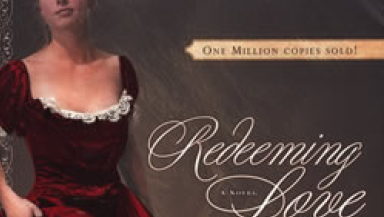
FR: I never take it for granted that I will write another book. Years ago, my entire focus was fixed upon my work. When I became a Christian, God took writing away. Nothing I wrote made sense. It took three years for me to understand writing had become an idol. By then, I had fallen in love with Jesus and writing ceased to matter.
During a home Bible study of the minor prophets and studying Hosea, Jesus opened the door again. I knew He wanted me to write another romance, but one in which He was the central figure. Because all my previous novels had been set in early California history, I set the story during the Gold Rush. I wanted readers to know the difference between 'romantic' love and the real thing, the love Jesus has for each of us and the lengths to which God will go to bring us safely home to Him.
I spent a year writing 'Redeeming Love'. When readers wrote and said they wished they could meet someone like Michael Hosea, I wrote back and told them they could. His name is Jesus.
Right now, I'm waiting. I have two characters in mind and an issue I'm working through that needs pondering. God will make it clear if and when He wants me to start writing again. That usually happens when the characters start carrying on conversations in my head and they won't keep quiet.
CM: I have had personal experience of having to go back into a community to ask for forgiveness, and was blown away by their gracious response. So Abra's journey back to Haven was particularly poignant for me. Do you have a part of her story that you relate most to?
FR: It is humbling to confess and ask for forgiveness. We expect condemnation. We forget we are all sinners, and a tender, repentant heart usually receives mercy.
It took me years to confess I had an abortion while in college. The guilt and shame of what I had done haunted me for years. I had told Rick shortly after we were married, and it haunted him, too, especially when I had miscarriages. He didn't believe God was punishing me, but I did. He hadn't grown up a Christian, but had a better view of God than I did.
Several years (and books) after becoming a Christian, God began nudging me to write a book about abortion. I fought Him. I'd argue that He had already forgiven me. Why did I have to go back over it all again? When I finally surrendered, the first thing I had to do before I started writing was tell my mother, children, in-laws, relatives and closest friends my story.
I knew once the book was published I'd be asked if I had had an abortion, and I would have to be honest. I didn't want my loved-ones hearing second hand. I expected shock and rejection from some. Instead, I received love and support.
I had been imprisoned by fear and shame for so long, and the process of writing 'The Atonement Child' brought healing. I was able to mourn my child and place him in the arms of Jesus. And I was able to leave my sin at the foot of the cross.
CM: While you have created an incredible 1950s Hollywood backdrop to your story, so many of the themes it covers are universal. What are the main 'lessons' you think people can take away from reading this book?
FR: There is no sin so terrible that we cannot take it to the cross and receive the forgiveness of God.
No matter how far away we have wandered, God loves us. God is waiting with open arms. When we repent, He runs to us and embraces us.
Jesus is the bridge. He did the work and made the way for us to come home. All we have to do is step out in faith.
Just because someone is beautiful and famous doesn't mean they are happy. Many are lost and desperate to find their way. Be a light in the darkness. Be a bridge person.
The Bridge to Haven is available from April 22, published by Tyndale House Publishers.












